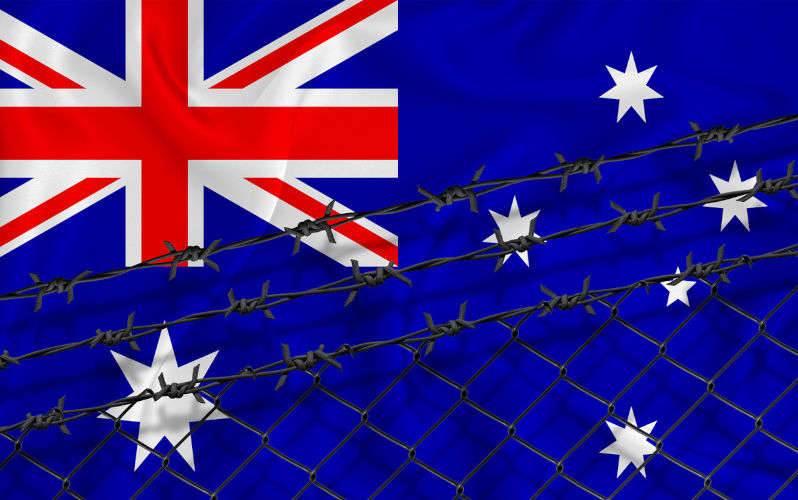Australia needs a royal commission into immigration detention
February 5, 2023
Australia needs a Royal Commission into its heinous, wasteful, privatised immigration detention policy. This is imperative in order to uncover immigration detention’s secrets, racism and appalling costs, to change public attitudes and to explore humane alternatives.
Australian immigration detention’s 30-year anniversary largely passed last year without comment. Successive Governments have denied responsibility, facts and wrongdoing, while immigration detention policy continues to dominate both major parties.
Although Australia’s Albanese Government has been moving from temporary to permanent protection visas, its 2022-23 budget offshore boosted detention expenditure from $150 million to a massive $632.5 million - despite no-one being processed offshore from 2014. (Manus Island Regional Processing Centre (RPC) closed in October 2017, and monthly departmental bulletins confirm Nauru RPC has been empty since March 2019). The Government has given the lucrative Nauru contract to a US prisons operator with a controversial human rights record. Onshore detention funding is an astounding $1.3 billion in 2022-23 and over one billion yearly thereafter. Meanwhile Australia’s supports of asylum-seekers’ social, medical, legal and educational needs are still lacking as they languish for indefinite periods, and its combined asylum-seeker and humanitarian resettlement intake is sparing (per capita and relative to GDP) compared to low-income recipient countries. The future of its ‘Legacy [never-to-be-resettled-in-Australia] Caseload’ is unclear. These decisions deserve sustained scrutiny.
Choosing private over public ownership of immigration detention perpetuates what’s been hidden for a quarter-century yet (paradoxically) which countless inquiries expose. This includes massive human rights abuses (child abuse, violence, medical negligence) staining our national reputation, severe almost universal mental illness which is untreatable in indefinite detention, high suicide rates and other deaths, often enduring effects in children and others exposed, forced returns to danger and sometimes death; and gross mismanagement and corruption. Consider for example that last week, another suspected suicide in immigration detention joined at least 14 other suspected or confirmed suicides since January 2018. For a small population (1315 at 31 October 2022), the equivalent suicide rates are roughly 100 times higher than community rates. Yet the regulator Comcare has only once laid Work Health and Safety charges against Home Affairs, relating to a 2019 suicide (a 20-day trial is pending). The policy has also harmed hundreds of Australian nurses, teachers, social workers, doctors and other staff who have served with service contractors.
Arguably offshore detention is privatised detention’s most damaging manifestation. It has bankrolled ex-Australian colony ‘client states’ (now sovereign nations) to demonstrate ‘deterrence’ and to stigmatise asylum-seekers arriving by boat. It is inaccessible to independent media and out-of-scope for independent official inspections, and massively wastes taxpayer resources ($9.65 billion from 2013 to 2021-2022). Despite colossal government debt, the annual per capita costs for detention of asylum-seekers in the community ($47,000) rise exponentially through $360,000 onshore to $3.4 million offshore.
Treasurer Jim Chalmers stated Australians deserve better than ex-PM Morrison’s waste and rorts. The Government, having promised greater transparency and accountability, has legislated a body to address government corruption. (This promise however evidently excludes places of detention, as the UN’s Subcommittee on the Prevention of Torture discovered recently, thus prematurely ending their long-scheduled visit). Why the new privatised offshore contract? Will offshore processing resume when new boats arrive? Does Labor believe detention deters asylum-seekers or people-smugglers, forces repatriation, ensures border security –all evidence-free propositions – thus justifying its harms? Our Indonesian neighbours in Aceh reach out to rescue desperate refugees arriving by boat: why can’t we?
The new Government is re-vitalising Australia with the Indigenous Voice to Parliament, climate action, women’s representation and safety. But to transform hearts and minds on this issue, we must hear from those affected whose voices are silenced, those who can clarify the policy’s maintenance, and those who remember when Australia was acknowledged a world leader in the humane, sustainable and efficient processing of those who came seeking our protection.
Commentators have argued this heinous policy persists because both major parties support it; we argue it persists because the policy controls both major parties.
Australians once supported a White Australia policy, the brutal suppression of Aboriginal and Torres Strait Islander peoples, and the incarceration of LGBTQIA people. We rightly recall these times with abhorrence and shame. Future generations will also wonder how we allowed this policy of state-sanctioned abuse that also prolongs White Australia, and even exported it to other countries (notably the UK).
A Royal Commission is crucial for naming the torture, cruelty, shocking harms and costs of privatised immigration detention, for destroying its social licence, and for decommissioning the policy’s racist, fear-mongering and stigmatising practices. A Royal Commission’s powers can uncover hidden truths and offer recognition for silenced voices, foreshadowing reconciliation, apology and reparation and identifying humane alternatives. It could potentially reveal new approaches to what Australians and asylum-seekers can offer each other. Can we remember our one-time generosity and restore such lost connections? Can we afford to not try?
Acknowledgements:
Thanks to Julie Macken, Ian Rintoul, John Highfield and Fran Gale for readings and suggestions regarding earlier drafts.
